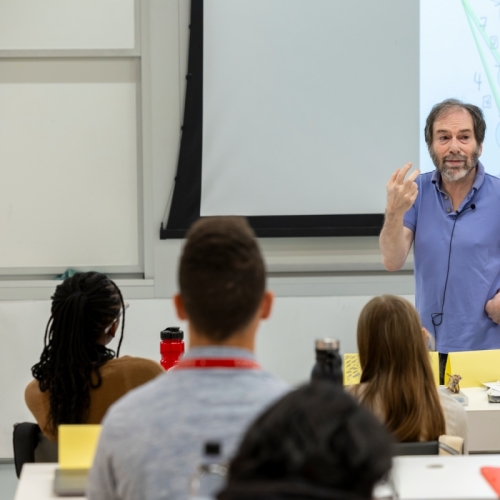News & Events
Summer Residential Precollege Spotlight: ENGRI 1101 Engineering Applications of Operations Research with Professor David Shmoys

by Shelley Preston,
SCE News, June 3, 2025
During the summer, Cornell’s School of Continuing Education (SCE) hosts hundreds of high school students from around the world on campus. The Precollege Studies residential program allows juniors and seniors to work closely with Cornell experts, study rigorous curriculum alongside undergraduates and earn college credit while living in a dorm.
One popular class open to residential Precollege students is ENGRI 1101 Engineering Applications of Operations Research, a three-credit course taught by David Shmoys, Cornell Engineering’s Laibe/Acheson Professor of Business Management and Leadership Studies, from July 14 to August 1, 2025.
The course introduces students to the problems and methods of operations research and information engineering, focusing on areas including inventory, network design and resource allocation.
SCE asked Dr. Shmoys what Precollege students can expect from taking his fast-paced, rigorous course over the summer.
How long have taught this course?
The course has evolved along with the revolution in digital technologies of the past 30 years, but I taught its direct antecedent for the first time in 1990. Yes, 1990.
What’s it like to teach a course where there are motivated high school students in class?
The first time I taught it to a cohort of high school students was through Cornell’s partnership with the National Education Equity Lab. It was an exhilarating learning experience, since the material of this course was very much about the computing-driven decision-making settings in the real world, such as how does Waze compute the right route for you to drive to your destination? How does Lyft match your ride request with a car to pick you up? How does Amazon decide how to locate where its next warehouse should be? High school students often don’t realize that the math that they are learning in high school serves as a foundation for these sorts of problems in the real world. And over the years, the majority of students that I have taught in this course have started this course on their very first day of classes at Cornell – so although no longer in high school, not separated from that high school experience by that much.
What is the ideal student for this course?
The ideal student is a rising high school senior, or possibly rising junior, who likes math, is interested in seeing how mathematical thinking can translate into the ability to frame decision-making issues precisely, and [who wants] to understand algorithmic approaches to arrive an good solutions. The students will use computers in this course, but they definitely don’t need to have experience in programming computers.



